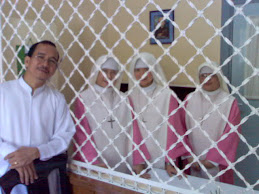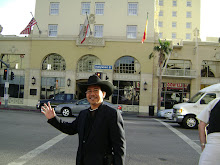The Gospel of the 2nd Sunday of Easter always brings us that scene in the Upper Room where for fear of the Jews the Apostles stayed locked and in the dark. I've been in that room myself when I had the chance to visit the Holy Land way back year 2000. Jesus comes and greets them "Peace be with you" three times. On the second time, he breathed on them and gave the Holy Spirit. "As the Father has sent me, so I send you. Whose sins you forgive shall be forgiven, whose sins you hold bound, they are held bound."
Why must we forgive?
Before I answer that question, I'd like to share what I read lately. Last month I underwent a personal crisis, and in the process of healing myself, I chanced upon in the internet a journal article entitled "Interpersonal Forgiving in Close Relationships: II. Theoretical Elaboration and Measurement" by Michael E. McCullough, et al. (1998) in the Journal of Personality and Social Psychology vol. 75, 6, 1586-1603. If I may summarize here what particularly struck me, it was the dynamics of the experience of being hurt. According to the study which asked people about their experience of being hurt, avoidance of the person who had hurt them, or withdrawal from contacts with them was a common experience. (Now I understand that keeping distance has a self-healing end. Thus, it is a challenge for me to understand the other when he starts to keep away from me when I shall hurt that person.) While alone, the rumination of thought took place. Revenge was a common experience as well among those who've been hurt.
But asked if those who've experienced hurt had forgiven those who hurt them, asking apology by the "hurter" was a common factor in forgiveness. This seemed to be a common denominator for forgiveness to be truly given. And those who forgave tended to have had close relationships with the "hurter."
Come to think of this: how come it is those who are close to us who dare to hurt us? What makes anyone among us think we have the right to hurt those we love? Is there really love when we hurt the other? Accepting the apology of the "hurter" seems to convey the following victim's message: "Ok, I accept your forgiveness, and hope you don't do it again. Because we've had some good times together, and for the sake of those times, we can start again. I am here to help you understand yourself in your process of learning how to control yourself."
Indeed, to forgive is to give the other another chance to grow and become better. Hence, the Resurrection becomes that great opportunity to really extend our patience at the other who's hurt us, and also a challenge for us to stop the hurting of others as well.
But why forgive?
In the many times I've been hurt myself, whenever the hurt was done in public, there was in me the need to be vindicated also in public. I remember one classmate who had hurt me in the presence of my other classmates. Even now, after I told that classmate to apologive in public, no public apology had come. Indeed, there seems to be too much self-enhancement in the person that may have kept that other from apologizing in public! But I remembered one scene, so poignant it sent shivers down my spine. That scene was when Pope JPII went to the jail cell of his assassin, Ali Agca Memet. Pope JPII had been hurt in public, but he forgave his "hurter" in public. I bet the Crucifixion experience of Christ that public forgiving God has given us. The Crucifixion is a public declaration of God that He has forgiven us in the many times we have hurt Him. Having been forgiven, having been sown the seed of forgiveness by the Lord Himself, we are then taught and challenged to make that seed of forgiveness bear fruit in forgiving the other. This is believe is the reason for forgiving.
Dr. Schlesinger of Australia, a forensic psychologist once in 1996(?) came to the Philippines. He brought with him the Spiral Test he himself had invented in order to identify those who are truly suffering from whiplash injuries from those who are simply malingering. I remember very vividly the directions he gave me since I volunteered to take the Test myself. The Spiral Test went this way: In front of me was a plate-size round object on which was printed the Spiral. The moment he put it on, I watched as it rolled clockwise. After some moments, he announced to me that he had stopped it. From that time, he started counting the time until I pushed a button to signify it had stopped. To my surprise, when he announced that he had put off the Spiral, the spiral in my head continued to move, but this time counterclockwise. I pressed the button after this movement stopped.
This experience helped me understand the nature of the rumination process. Like the epxerience of those who've gone through trauma, the coming back of thoughts and memories about the incidence seems to be a natural part of the brain's reaction to the experience. I remembered the spring of the notebooks we have. Once freed from being twisted, it recoils back until it has gone back to its former form. The rumination process seems to be that recoiling process of the brain in order to achieve a state of equilibrium and stability.
Sometimes, the rumination seems not just a physiological process, but a psychological process as well. For how do we account those who don't seem to have forgotten even after some time? For me, when we shall have gone through the insight of why something happened to us, the lessons shall have become the receptacle which ensures the "forgetting" of the experience.
Thanks be to God Who started this forgiving process, or else what a life to live without being forgiven! Truly, the Lord is risen! Alleluia! Alleluia.
Sunday, March 30, 2008
Subscribe to:
Post Comments (Atom)


No comments:
Post a Comment